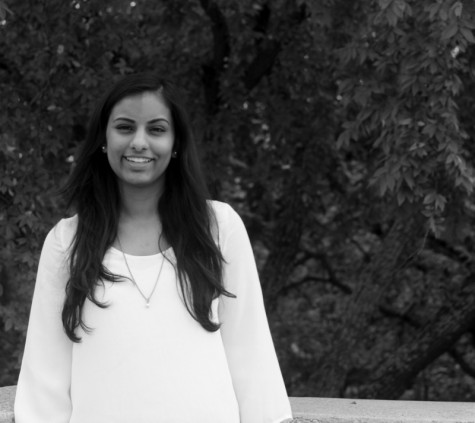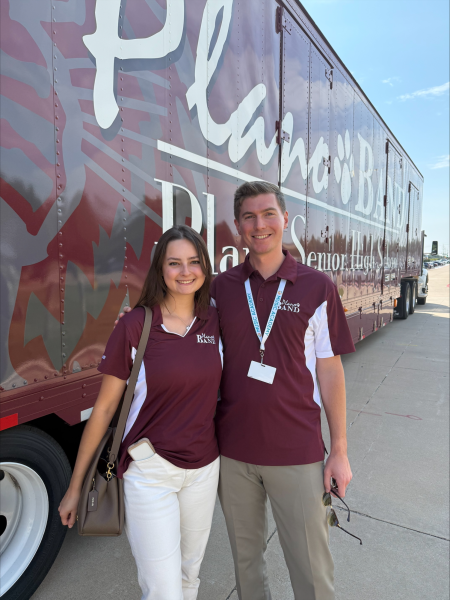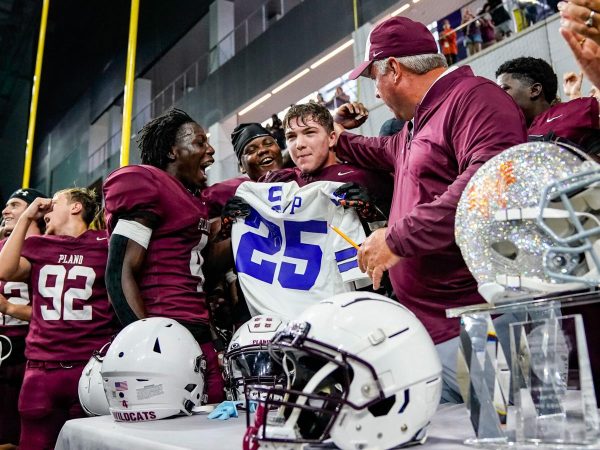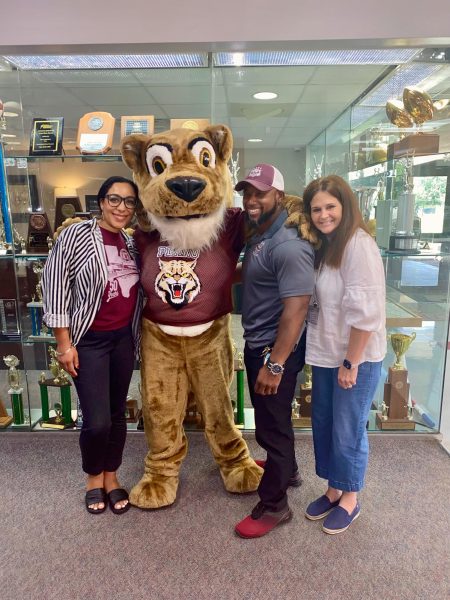Students recognized for science fair experiments and research
She conducts her research mostly at school, although she doesn’t stop there. When junior Ria Chhabra returns to her house, she works on a makeshift lab.
“It’s just like a desk with all my little beakers and stuff on it,” Chhabra said. “You have to be really careful with most of the experiments you do and you can’t drop them anywhere obviously, because your mom will get mad.”
The time has come once again for students to display their hard work at the Plano District Science Fair, which took place on Feb. 5 and the Dallas Regional Science & Engineering Fair on Feb. 15.
Students’ projects range in a wide variety of topics. Junior Johnathon Chang is using the direct binding abilities of a bacterial protein called HasA Hemophore to restrict oxygen consumption of cancerous lung cells in order to decrease cancer cell growth. He chose the topic because of the prevalence of cancer worldwide.
“I had to deal with the loss of my grandmother who passed away from lung cancer a few years ago,” Chang said. “I hope that in the future nobody has to deal with that kind of loss.”
Chang has participated in science fairs since sixth grade. For his project this year, he started work in the summer at the University of Texas at Dallas’ Natural Science and Engineering Laboratory. Throughout Chang’s experiment, he encountered some roadblocks, such as when two of his tissue cultures became contaminated.
“We had to get rid of the tissues and bleach the incubator,” Chang said. “It wasn’t that big of a deal, but it was disappointing knowing I had lost two data points.”
Chang was able to observe others’ projects in areas such as new energy sources, cancer treatments and technologies.
“For me, it’s not about winning,” Chang said. “My favorite thing about science fair is seeing what other kids like me are doing to make an impact. The student next to me found a potential treatment for dementia. I’m amazed at the cool things that our generation is doing to better the world.”
Like Chang, Chhabra conducted an experiment that could potentially help humans. Her project tests for the difference between organic and inorganic foods in multiple ways. She decided to start this because organic foods are an issue in her house.
“My mom, like a lot of people, thinks organic foods are good for you,” Chhabra said. “But I didn’t really know if they are and what the real benefit of eating organic foods was. Is it just a little bit of a difference, or is it a lot? That’s the main thing that prompted me to do this. We know that organic farms are better for the environment, but we don’t really know if they’re better nutritionally or not. We just know that they’re more expensive.”
As a part of her research, she created a pesticide detector to detect the amount of pesticides in fruits and vegetables.
“It’s also useful for third world countries and basically any remote locations for the military,” Chhabra said. “If they need to test for any diseases, the first thing they look at is diets or eating. They can test for toxic chemicals by using this.”
Additionally, Chhabra tested for the impact of organic and inorganic foods on fruit fly health because she wanted to see how it directly impacted organisms. She looked at how it impacted their activity, fertility, stress resistance and more factors relatable to human conditions.
Overall, Chhabra discovered that organic foods proved to be healthier. She said they had more nutrients by about 50 percent, less heavy metals by about 50 percent, and fewer pesticides.
“It was somewhat expected,” Chhabra said. “But I didn’t expect the differences to be that large.”
Although Chhabra has been involved in science fair for many years, she did not become serious about it until she reached seventh grade, as that was the first time her project placed and took her to state.
“In seventh grade, I really had no expectations for science fair,” Chhabra said. “I didn’t expect that to be my thing. I did this project on swimsuits, because I swim and that was just really interesting to me. It ended up going to state, and so that really got me into it.”
When she first started working in a real lab, Chhabra had to adjust to the new environment and the expectations that came with it.
“I cannot begin to explain to you how confused I was on the first day,” Chhabra said. “My professor spent about 20 minutes talking to me about laboratory protocol, which included a quick lesson over what to do if I let the flies out of their vials. It’s not as scary as it sounds.”
Uncertainty in her research was another obstacle she faced but later managed to overcome.
“I like to be sure of what I’m doing, and scientific research is the epitome of uncertainty,” Chhabra said. “But I did what I could and embraced it. In the long run it has changed me as a person, but I think for the better.”
Throughout all her experiences, Chhabra said that working in the lab was one of the most surreal things that has ever happened to her.
“I discovered my passion for scientific research, and like most of the things we love, I have no reason for why I love it,” Chhabra said. “I love being able to listen to music while working. I love being able to talk to intelligent people about things as silly as T.V. shows. I love knowing that I am doing something that might change the world one day.”
She has won a multitude of awards at many different levels, including Grand Prize at the Texas Junior Academy of Science. At the district fair on Wednesday, Feb. 5, Chhabra took home second place in her category.
“I’m grateful that I got an award, but I was not exactly ecstatic,” Chhabra said. “I’ve worked hard, and my science fair project is my pride and joy. I think that it deserves so much more than 2nd place. But that’s just me. And now I’m starting to make it sound like my science fair project is my child or my boyfriend.”
Your donation will support the student journalists of Plano Senior High School. Your contribution will allow us to purchase equipment and cover our annual website hosting costs.

Senior Sonam Benakatti loves to both design and write and is fortunately able to do both in her positions as Managing Editor and Business Manager of the...







